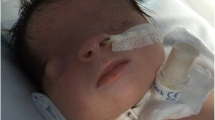Abstract
This article reports two families with children having acrocallosal syndrome, an autosomal recessive disorder characterized by agenesis of corpus callosum, facial dysmorphism and polydactyly along with psychomotor retardation. Both families sought genetic counseling in subsequent pregnancies. Although the gene for the disorder is not yet identified, prenatal diagnosis was attempted by ultrasound studies. In both families, an affected fetus was diagnosed in the presence of postaxial polydactyly of hands and absence of corpus callosum. It is emphasized that pediatricians should make precise diagnosis in cases of dysmorphism and mental retardation, as this enable prenatal diagnosis in future pregnancies.
Similar content being viewed by others
References
Koenig R, Bach A, Woelki U, Grzeschik K-H, Fuchs S. Spectrum of the Acrocallosal syndrome.Am J Med Genet 2002; 108:7–11.
Schinzel A, Kaufmann U. The acrocallosal syndrome in sisters.Clin Genet 1986; 30:399–405.
Schinzel A. The acrocallosal syndrome in first cousins: widening the spectrum of clinical features and further support for autosomal recessive inheritance.J Med Genet 1988; 25:332–336.
Cataltepe S, Tunckbilek E. A family with one child with acrocallosal syndrome, one child with anencephalypolydactyly and parental consanguinity.Eur J Pediatr 1992; 151:288–290.
Courtens W, Vamos E, Christophe C, Schinzel A. Acrocallosal syndrome in an Algerian boy born to consanguineous parents: review of the literature and further delineation of the syndrome.Am J Med Genet 1997; 69:17–22.
Gelman-Kohan Z, Antonelli J, Ankori-Cohen H, Adar H, Chemke J. Further delineation of the Acrocallosal syndrome.Eur J Pediatr 1991; 150:797–799.
Pfeiffer RA, Legal G, Trautmann U. Acrocallosal syndrome in a child with denovo inverted tandem duplication of 12pll.2- pl3.3.Ann Genet 1992; 35:41–46.
Christensen B, Blaas HG, Isaksen CV, Roald B, Orstavik KH. Sibs with anencephaly, anophthalmia, clefts, omphalocele, and polydactyly: hydrolethalus or acrocallosal syndrome?Am J Med Genet 2000; 91:231–234.
Jones KL. Acrocallosal syndrome. InSmith’s Recognizable Patterns of Human Malformation. 5th edn. WB Saunders Company 1997; 226–227.
Romero R, Piln G. Prenatal diagnosis of cerebrospinal anomalies. In Fleischer AC, Mannins FA, Jeanty P, Romero R, eds.Sonography in Obstetrics and Gynaecology-Principles and Practice, 6th edn. McGraw Hill Company. 2001; p. 380–381.
Author information
Authors and Affiliations
Rights and permissions
About this article
Cite this article
Bijarnia, S., Baijal1, A. & Verma, I.C. Genetic counseling in acrocallosal syndrome. Indian J Pediatr 70, 169–171 (2003). https://doi.org/10.1007/BF02723748
Issue Date:
DOI: https://doi.org/10.1007/BF02723748




